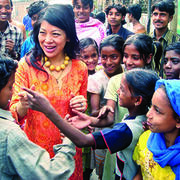
Karen Tse had a vision. As a second-year student at HDS in the late 1990s, she imagined founding an organization that would end the use of torture by law enforcement around the world.
She even made her dream the topic of her master of divinity thesis. Still, she was unsure about whether or not she could succeed. When she received her thesis back from one of her advisors, Professor David Little, she found at the top of the cover page four words that gave her confidence—and courage.
“It can be done,” Little wrote.
Tse (pronounced “cheh”) told the story of her journey from divinity student to international human rights leader to a rapt audience in the Sperry Room of Andover Hall on October 12. During the 90 minute talk—one of a series of events marking HDS’s bicentennial—she spoke about “leading from within,” human rights as ministry, and how she leverages her HDS experience to effect global change.
Tse joked that she may have “set the record for deferring admission to HDS.” After applying successfully in 1986, she decided on a different path. She worked overseas in refugee camps, earned a law degree at UCLA, and spent years in Cambodia as a human rights lawyer working with the UN. When she finally arrived at HDS in 1997, she was surprised by the rigor of the curriculum.
“I thought that when I came to divinity school, I would finally be able to do what I wanted,” she said. “I thought I could be intuitive. But HDS was actually a much more intellectual environment than my law school experience.”
As an MDiv student, Tse traveled to Vietnam to fulfill her field education requirement. There she met with lawyers defending prisoners and found, to her dismay, the same kinds of abuses she had witnessed in Cambodia. Some inmates were children, tortured and thrown into jail for minor crimes. The vast majority weren’t political prisoners—the types of cases that most often catch the attention of the media—they were poor people who didn’t have access to a lawyer. The world looked away.
“It’s shadow work,” she said of the effort to help those deprived of due process of law. “We prefer to think about good people that we help and bad people who ought to be in prison. [Investigative torture] has not traditionally been an area that people want to look at.”
When Tse returned to HDS, she worked with Professor Little and Dudley Rose, associate dean for ministry studies, and learned “that we co-create history. We have to commit to it and transform from within.” With their support, she founded International Bridges to Justice (IBJ), an organization that works to end investigative torture through early access to legal counsel. Today, IBJ is active in over 40 countries around the world, training scores of defense lawyers, police, prosecutors, and judges. Named one of "America’s Best Leaders" by US News and World Report, Tse has served as a United Nations Judicial Mentor, negotiated measures for judicial reform in China and Vietnam, and expanded IBJ’s programming to Rwanda, Burundi, Zimbabwe, the Democratic Republic of Congo, and India.
Tse said that Cambodia, the country that most inspired her to found IBJ, is one of the organization’s greatest success stories. When she went to live there in the mid-90s, Tse remembered, the nation was still reeling from the Khmer Rouge’s massacre of intellectuals—including most of its lawyers. Torture by law enforcement was common, as was detention without access to counsel. Today, thanks to the work of IBJ’s defenders, public information campaigns, and trainings for judges, prosecutors, and police, the use of investigative torture is down dramatically—only about five percent of prisoners, down from nearly 100 percent in years past.
“[A police officer told us] ‘Even if the lawyer doesn’t show up, we don’t torture people anymore,’” Tse said “‘because we know that an IBJ defender is coming.’”
Advocacy and better legal processes are important for progress, Tse said, but must be coupled with a personal transformation on the part of the perpetrators of torture. She told the story of a training in Myanmar, ruled by a military junta until 2011 and the site of rampant human rights violations. IBJ brought military police together with lawyers and activists—some of whom had themselves been tortured—for talks about how to reform the country’s criminal justice system. There was immense tension in the room every day. When Tse saw the police isolated from others in the group, she decided to reach out to them. One of the officers was particularly forthcoming.
“He said that ‘There was torture [during military rule], but there is torture today too.’ Then he told me that ‘If we really want to transform, we must release,’ so I asked if we could go to the Buddhist temple together. The monk blessed and prayed with the officers. The entire energy of the training changed and the real work began to see beyond what had happened in the past and how we could create a new story together.”
Tse said that much remains to be done. She told the audience that there are millions of people around the world in pre-trial detention without access to counsel. Out of the 113 developing countries that practice torture, 93 have passed laws against it, but they are often unenforced. Even so, Tse says that she believes the world can eliminate investigative torture within her lifetime. The path to progress lies in a quote from the Vietnamese Buddhist monk Thich Nhat Hanh, which she paraphrased toward the end of her talk.
“What do we need to do to save the world?” she asked. “In order to save the world we must allow ourselves to hear the cries of the world. If we allow ourselves to hear, then we can also see what we can do.”
—by Paul Massari
